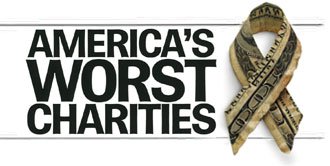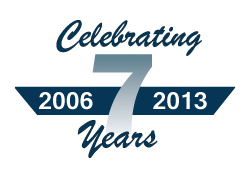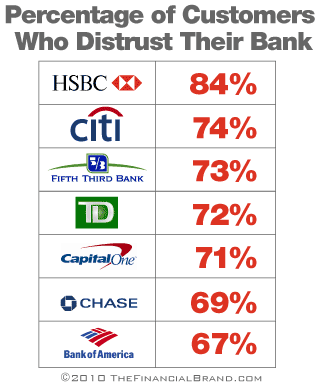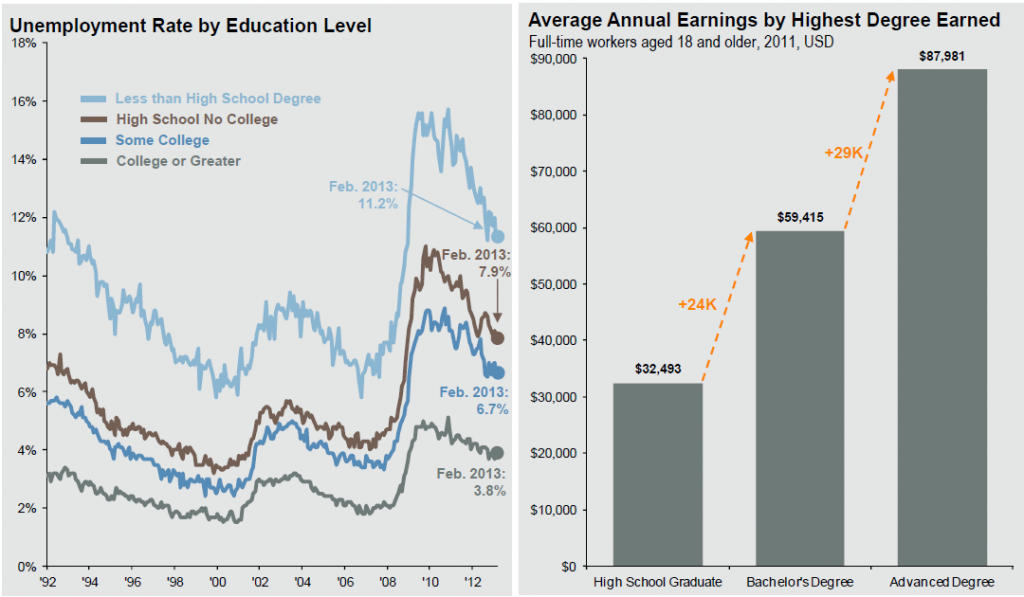America’s Worst Charities
 The Tampa Bay Times and the Center for Investigative Reporting identified the 50 worst charities in the US (see table below). These are organizations that purport to help the needy but devote pennies on the dollar to worth causes. The Pulitzer Prize worthy series is published in the Tampa Bay Times: America’s Worst Charities.
The Tampa Bay Times and the Center for Investigative Reporting identified the 50 worst charities in the US (see table below). These are organizations that purport to help the needy but devote pennies on the dollar to worth causes. The Pulitzer Prize worthy series is published in the Tampa Bay Times: America’s Worst Charities.
Here’s an eye-opening and infuriating preview:
The worst charity in America operates from a metal warehouse behind a gas station in Holiday.
Every year, Kids Wish Network raises millions of dollars in donations in the name of dying children and their families.
Every year, it spends less than 3 cents on the dollar helping kids.
Most of the rest gets diverted to enrich the charity’s operators and the for-profit companies Kids Wish hires to drum up donations.
In the past decade alone, Kids Wish has channeled nearly $110 million donated for sick children to its corporate solicitors. An additional $4.8 million has gone to pay the charity’s founder and his own consulting firms.
The following tips can help you make an informed decision when the phone rings from a charity:
Key questions to ask the caller:
- What is the full name of the charity?
- Do you work for a paid fundraiser?
- How much of my donation actually goes to charity?
- Will any local programs directly benefit? If so, how?
- What is the website address of the charity?
Key facts to know:
- The best charities spend no more than 35 cents of every dollar raised on fundraising costs
- America’s worst charities spend more than 80 cent of every dollar on fundraising
- Charities that use telemarketing firms and fundraisers are far more likely to receive only a fraction of the money raised
The 50 Worst, Ranked by Money Blown on Soliciting Costs
| Rank | Charity name | Total raised by solicitors | Paid to solicitors | % spent on direct cash aid |
|---|---|---|---|---|
| 1 | Kids Wish Network | $127.8 million | $109.8 million | 2.5% |
| 2 | Cancer Fund of America | $98.0 million | $80.4 million | 0.9% |
| 3 | Children’s Wish Foundation International | $96.8 million | $63.6 million | 10.8% |
| 4 | American Breast Cancer Foundation | $80.8 million | $59.8 million | 5.3% |
| 5 | Firefighters Charitable Foundation | $63.8 million | $54.7 million | 8.4% |
| 6 | Breast Cancer Relief Foundation | $63.9 million | $44.8 million | 2.2% |
| 7 | International Union of Police Associations, AFL-CIO | $57.2 million | $41.4 million | 0.5% |
| 8 | National Veterans Service Fund | $70.2 million | $36.9 million | 7.8% |
| 9 | American Association of State Troopers | $45.0 million | $36.0 million | 8.6% |
| 10 | Children’s Cancer Fund of America | $37.5 million | $29.2 million | 5.3% |
| 11 | Children’s Cancer Recovery Foundation | $34.7 million | $27.6 million | 0.6% |
| 12 | Youth Development Fund | $29.7 million | $24.5 million | 0.8% |
| 13 | Committee For Missing Children | $26.9 million | $23.8 million | 0.8% |
| 14 | Association for Firefighters and Paramedics | $23.2 million | $20.8 million | 3.1% |
| 15 | Project Cure (Bradenton, FL) | $51.5 million | $20.4 million | 0.0% |
| 16 | National Caregiving Foundation | $22.3 million | $18.1 million | 3.5% |
| 17 | Operation Lookout National Center for Missing Youth | $19.6 million | $16.1 million | 0.0% |
| 18 | United States Deputy Sheriffs’ Association | $23.1 million | $15.9 million | 0.6% |
| 19 | Vietnow National Headquarters | $18.1 million | $15.9 million | 2.9% |
| 20 | Police Protective Fund | $34.9 million | $14.8 million | 0.8% |
| 21 | National Cancer Coalition | $41.5 million | $14.0 million | 1.1% |
| 22 | Woman To Woman Breast Cancer Foundation | $14.5 million | $13.7 million | 0.4% |
| 23 | American Foundation For Disabled Children | $16.4 million | $13.4 million | 0.8% |
| 24 | The Veterans Fund | $15.7 million | $12.9 million | 2.3% |
| 25 | Heart Support of America | $33.0 million | $11.0 million | 3.4% |
| 26 | Veterans Assistance Foundation | $12.2 million | $11.0 million | 10.5% |
| 27 | Children’s Charity Fund | $14.3 million | $10.5 million | 2.3% |
| 28 | Wishing Well Foundation USA | $12.4 million | $9.8 million | 4.6% |
| 29 | Defeat Diabetes Foundation | $13.8 million | $8.3 million | 0.1% |
| 30 | Disabled Police Officers of America Inc. | $10.3 million | $8.1 million | 2.5% |
| 31 | National Police Defense Foundation | $9.9 million | $7.8 million | 5.8% |
| 32 | American Association of the Deaf & Blind | $10.3 million | $7.8 million | 0.1% |
| 33 | Reserve Police Officers Association | $8.7 million | $7.7 million | 1.1% |
| 34 | Optimal Medical Foundation | $7.9 million | $7.6 million | 1.0% |
| 35 | Disabled Police and Sheriffs Foundation | $9.0 million | $7.6 million | 1.0% |
| 36 | Disabled Police Officers Counseling Center | $8.2 million | $6.9 million | 0.1% |
| 37 | Children’s Leukemia Research Association | $9.8 million | $6.8 million | 11.1% |
| 38 | United Breast Cancer Foundation | $11.6 million | $6.6 million | 6.3% |
| 39 | Shiloh International Ministries | $8.0 million | $6.2 million | 1.3% |
| 40 | Circle of Friends For American Veterans | $7.8 million | $5.7 million | 6.5% |
| 41 | Find the Children | $7.6 million | $5.0 million | 5.7% |
| 42 | Survivors and Victims Empowered | $7.7 million | $4.8 million | 0.0% |
| 43 | Firefighters Assistance Fund | $5.6 million | $4.6 million | 3.2% |
| 44 | Caring for Our Children Foundation | $4.7 million | $4.1 million | 1.6% |
| 45 | National Narcotic Officers Associations Coalition | $4.8 million | $4.0 million | 0.0% |
| 46 | American Foundation for Children With AIDS | $5.2 million | $3.0 million | 0.0% |
| 47 | Our American Veterans | $2.6 million | $2.3 million | 2.3% |
| 48 | Roger Wyburn-Mason & Jack M Blount Foundation For Eradication of Rheumatoid Disease | $8.4 million | $1.8 million | 0.0% |
| 49 | Firefighters Burn Fund | $2.0 million | $1.7 million | 1.5% |
| 50 | Hope Cancer Fund | $1.9 million | $1.6 million | 0.5% |
Source: Tampa Bay Times

















